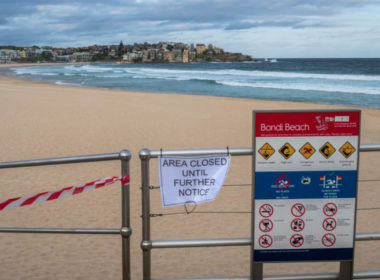The formation of National Cabinet at the beginning of the COVID-19 pandemic was welcomed as an opportunity for often-feuding state leaders to work efficiently together in a crisis. However, a new bill proposes the work of this committee be shielded from public view.
In July last year, Senator Rex Patrick lodged two freedom of information applications for access to National Cabinet documents. The new intergovernmental body, formed of Australia’s premiers and chief ministers in the earliest days of the COVID-19 pandemic, had piqued his interest.
“I looked at it and said, it’s not a cabinet, you can’t create this secret body, that’s not how things work,” Patrick tells LSJ. “I have a transparency and accountability streak that runs through me, and I just looked at it and said that’s not right”.
Under the Freedom of Information (FOI) Act, Federal Cabinet documents are exempt from requests for public disclosure. This exemption protects the deliberations and decisions of Cabinet and ensures that debate is not stymied by concerns about public disclosure. The exemption also extends to documents of committees of the Cabinet.
However, simply calling a regular meeting of the heads of each jurisdiction a “National Cabinet” does not automatically make it so.
Senator Patrick’s requests for access to National Cabinet documents were initially refused; the Department of Premier and Cabinet claiming the documents were exempt under the FOI Act. The resulting tension over what constitutes a committee of the Cabinet, and the circumstances in which high-level committees can be shielded from public disclosure, has led to a legal battle and continuing debate over government secrecy. A broader question lies in what government deliberations should be held back from public view.
The Patrick case
Disputing the Department’s assertion that National Cabinet is a “Committee of the Cabinet” under FOI laws, Senator Patrick took his appeals to the Administrative Appeals Tribunal (AAT). There, AAT Deputy President Justice Richard White disagreed with the Department’s claim that National Cabinet documents should be exempt under FOI legislation.
“The mere use of the name ‘National Cabinet’ does not, of itself, have the effect of making a group of persons using the name a ‘committee of the Cabinet’,” said Justice White.
“Nor does the mere labelling of a committee as a ‘Cabinet committee’ have that effect.”
Justice White found that National Cabinet does not derive powers from the Federal Cabinet, nor is it under control of the Prime Minister. Rather than acting in solidarity, some members of National Cabinet have acted contrary to its decisions. State border closures was one example.
The COAG bill
The Department did not appeal Justice White’s decision, and Senator Patrick was granted access to the documents, receiving them 28 days later. The Government then sought to introduce legislative changes that would extend the protections against disclosure of information contained in Cabinet documents to documents of the National Cabinet and its committees. Opposition and crossbench senators have criticised the proposed law for attempting to shroud government work in secrecy and limit the public’s access to information. Many legal experts are also concerned by the potentially dangerous precedent being set.
The COAG Legislation Amendment Bill 2021 (COAG bill) was referred to the Senate Finance and Public Administration Legislation Committee. Most submissions to the Committee were critical of the proposed extension of the FOI protections, including one from the Law Council of Australia.
President Dr Jacoba Brasch QC of the Law Council of Australia, tells LSJ: “The blanket exemption for an intergovernmental body is not one that we see is justified.”
Brasch says there are already adequate processes in place to strike the right balance between disclosure and protecting information that ought to be kept confidential. She also notes that National Cabinet’s predecessor, COAG, was amenable to freedom of information requests.
“The concern is trying to pretend that an intergovernmental body which is comprised of premiers of each jurisdiction who are essentially equal in status, is in fact a body that is subordinate to the Commonwealth Cabinet”
“With COAG, freedom of information applications could be made and there are adequate safeguards there. There’s the balancing act, as with all such matters, of where does the public interest lie – does the public interest lie in something not going out, or does the public interest lie in disclosure?”
The Senate Committee also received submissions from the Office of the Information Commissioner, the Human Rights Commission, and constitutional law expert, University of Sydney Professor Anne Twomey.
Twomey, an academic specialising in Australian constitutional law, appeared at the Committee hearing. She insists asserting that the National Cabinet is nothing more than a committee of the Federal Cabinet, is detrimental to the federal system.
“The concern is trying to pretend that an intergovernmental body which is comprised of premiers of each jurisdiction who are essentially equal in status, is in fact a body that is subordinate to the Commonwealth Cabinet,” Twomey says.
“It’s wrong, it’s nonsense, it’s inconsistent with the reason for Cabinet confidentiality which comes back to the principles of responsible government.”
Of further concern is the potential to extend confidentiality to documents created by advisory bodies like the Australian Health Protection Principal Committee and other committees established by the National Cabinet. According to Twomey, this devolution of responsibility and protection is “murky”.
“We’ve now got to the point of saying that we have Cabinet committees which have not a single person on them who is responsible to any parliament in the country. That is so far removed from what cabinet confidentiality is there for as a principle, that it is absurd,” she says.
Recent developments
In late October, the Department of Premier and Cabinet refused another applicant’s request for access to minutes of National Cabinet meetings. Barrister Geoffrey Watson SC, who acted for Senator Patrick in the AAT proceedings, tells LSJ the department’s refusal to provide access to the documents after the AAT determination is “contrary to the spirit and the force of the FOI legislation which was designed to provide a means of enforcing the public’s right to these documents”.
However, Watson emphasises the outcome in the Patrick case does not mean all National Cabinet documents will be accessible: “If there are some which are subject to claims of national security or commercial in confidence…obviously things like that are not going to become automatically available to the public and all of the proper based privileges would attach.”
In November, Senator Patrick received another refusal for access to National Cabinet documents on the basis that, among other things, the Department considers the National Cabinet to be a committee of the Cabinet for the purpose of the FOI Act. Senator Patrick has written to the Information Commissioner requesting a referral to the Federal Court for a judicial determination on that matter. He tells LSJ he originally sought access to the minute and notes of the National Cabinet to get a determination about whether it was a committee of the Cabinet, regardless of what was in the documents: “They gave me all the minutes that I asked for and when I look at them, there isn’t anything that’s controversial in them”.
However, he also notes openness and transparency are fundamental principles of responsible government. While he acknowledges some information generated by an intergovernmental body might be confidential, the position of National Cabinet is at odds with those principles.
“Their starting point is everything is confidential and that’s not how our federal or state systems of responsible government work. That’s the sort of thing I’m trying to defend.”




